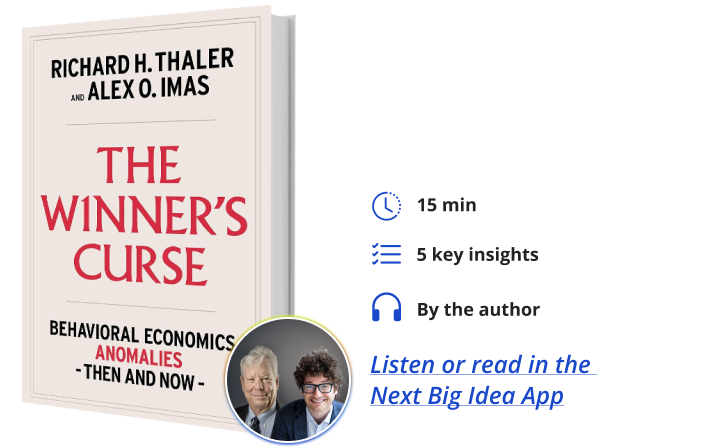Below, co-authors Richard Thaler and Alex Imas share five key insights from their new book, The Winner’s Curse: Behavioral Economics Anomalies, Then and Now.
Richard received the 2017 Nobel Prize in economic sciences. He is a distinguished professor of behavioral science and economics at the University of Chicago Booth School of Business. Alex is a chaired professor of behavioral science, economics, and applied AI at the University of Chicago Booth School of Business. He is the recipient of multiple honors, including the Sloan Research Fellowship.
What’s the big idea?
Anomalies surprise us by completely defying expectations. We like to think that economic principles can reliably predict outcomes, but in reality, our financial decision-making is full of anomalous behavior. Understanding the weird choices people make in seemingly “no-brainer” situations is informative, fun, and could save you money.

1. The endowment effect.
The field of economics, which has a huge impact on policy and how different regulations are set, is based on a set of mathematical models. These models are based on concrete principles that describe how people behave, the gist of which is that people always make the best decisions they can, given the situation they’re in—they optimize.
Given the importance of these models, it is crucial that they be stress-tested. Are these models grounded in good scientific tests? Just like a bank undergoes a stress test to make sure that it can function if there are certain shocks to the system, economic models can be stress tested to make sure their predictions actually hold. And that’s how the anomalies came to be noticed.
Experiments and other empirical tests were designed such that the models would make a clear prediction, and studies showed that many of these predictions were frequently violated. These violations are the anomalies of economic theory. A big part of the reason for this is that economic theory left people out of its equations. To get better models, the psychology of human nature needs to be incorporated. Otherwise, economists’ predictions will be incorrect.
“To get better models, the psychology of human nature needs to be incorporated.”
For example, one of my professors was a wine lover. He had purchased some nice bottles for a few dollars, and then a few years later, they became worth over $100. He would occasionally drink one of those bottles on a special occasion. Nothing odd here yet, but he told me two things that constituted an anomaly. He said that his local wine merchant offered to buy some of those bottles at the market price, but he didn’t sell. However, he would not buy bottles that cost more than $50. That means that there are bottles that he would neither buy nor sell at a given price. That does not make sense to an economist because either the bottles are worth more than $100, in which case he should be willing to buy others, or they are worth less than $100, in which case he should be willing to sell! I named this phenomenon the endowment effect. People demand more to give up something they already have than they would be willing to pay to acquire it.
2. The winner’s curse.
The basic principle here is that bidders in auctions, especially experienced firms, should not repeatedly participate in auctions where the winners routinely lose money. You might think that no one would do that, but consider the following simple example.
Let’s say you go to a bar with a jar of coins and auction it off. The winner of the auction gets the money in the jar. What tends to happen? Let’s say the jar of coins contains $25. Although most bids for the jar will be for less than $25 (bidders tend to avoid taking risks), the winner of the auction almost always pays more than $25. That means you, as the owner of the jar, just made money, and the “winner” of the auction just lost money.
A version of this jar of coins example has been done in hundreds of classroom demonstrations. But does this happen in business decisions? Yes, this winner’s curse was discovered by oil executives. Oil companies participated in many auctions for the right to drill a well in many potential locations. Although they had world-class engineers estimating the amount of oil in the ground, at the locations for which they won the auction, there was systematically less oil pumped out than the engineers had predicted.
The oil wells and the jars of coins work the same way. People make estimates of how much something is worth. No one knows for sure, so the estimates vary quite a bit, with some estimates being too optimistic and others too pessimistic. Who is most likely to win the auction? Those who are too optimistic, because they end up bidding the most. To avoid the winner’s curse, you must do something counterintuitive: The more bidders there are, the less you should bid! The goal is to not lose.
3. Mental accounting.
The economic principle here is that money has no labels. Money is said to be fungible, meaning it can be replaced by another identical item. Suppose you win a lottery and receive $1,000 in cash. The money comes in three envelopes, each containing bills of the same denomination: $10s, $20s, and $100. The principle says that you should not spend the money within the envelope of $20s differently from the one with the $10s, but people violate this all the time. We call this mental accounting.
“A dollar is a dollar, and it doesn’t matter where it came from.”
During the financial crisis, the price of gasoline dropped by half, so families were spending much less to fill up their cars than they had become used to. Suppose they were saving $40 a week. What should they do? The smart thing would be to use that extra money in the best possible way, maybe by buying better food or paying off credit card debt. Surely many families did such things, but some reacted quite strangely: they decided to treat their car occasionally to a higher grade of gas (which is useless for most cars) because they had leftover money in the gas budget.
A dollar is a dollar, and it doesn’t matter where it came from. If you save some money in one domain, you don’t have to focus on that domain when deciding what to do with the savings.
4. Dominance in economics.
The idea is that between two options, there is one that is better in every respect. Say you are picking something for a family dinner, and there is one option that tastes better, is healthier, and costs less money. You should buy that one, right? But people often get this no-brainer wrong.
Suppose you’re choosing between health insurance plans and there are two choices. Plan A has no monthly premium but has a $1,000 yearly deductible, meaning that you must pay costs up to $1,000, and then the plan kicks in, and you don’t have to pay anything after that. Plan B has no deductible but a $100 monthly premium. What should you choose?
Here is an easier question: Would you rather pay $1,200 a year for sure or at most $1,000? No one could get that wrong, could they? Well, yes actually. There is a paper by three behavioral economists called “Choose to Lose” that shows that as many as half of Americans who choose a health insurance plan at work are choosing an alternative that will cost them more money (hundreds of dollars per year), regardless of how much healthcare they consume. Generally speaking, you will save money over time by choosing a higher deductible. You will lose money by buying extended warranties.
5. The law of one price.
Do stock prices reflect underlying value? This can be hard to test. The market value of Apple Corporation is over $3 trillion, but is it worth more or less than that? The same asset should not sell for two different prices at the same time. No matter where you buy shares of Apple, you should pay almost the same price. It should not cost $200 per share in one place and $400 in another. Economists call this the law of one price.
“It’s not so easy to beat the market.”
But in somewhat less obvious situations, the law of one price is violated. I wrote a paper with my friend Owen Lamont showing exactly such a violation. In the 1990s, a company called 3Com had a Palm division that made the Palm Pilot—kind of an iPhone predecessor. 3Com thought it was not getting the respect it deserved on the stock market. So, 3Com made Palm into a separate company.
When there was an initial public offering for Palm, each 3Com shareholder would receive 1.5 shares of Palm. So, there would be two ways to buy Palm: directly or by owning 3Com. On the day of the IPO, Palm shares soared with excitement, but 3Com? Not so much. The strange result was that 3Com became worth less than its ownership stake in Palm! That meant you could buy a share of 3Com for less than a share of Palm, which would include 1.5 shares of Palm. In fact, the market valued 3Com (a profitable company) at minus $25 billion.
During the recent meme stock craze that followed COVID, there were similar examples, especially with companies such as AMC and GameStop. The stock market does not seem to have gotten more efficient, but at least the stories have become funnier. Stock prices can be crazy. It’s not so easy to beat the market.
Enjoy our full library of Book Bites—read by the authors!—in the Next Big Idea App:
































